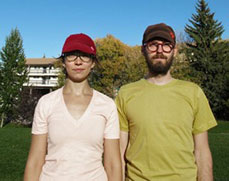Skatepark public art project
Calgary based artists Eric & Mia worked with the design team for the Skateboard Amenities Strategy to explore creative visioning for skatepark designs, and create three temporary, community-focused, public art projects, collectively titled No Longer Impossible.
Public Art Budget: $30K
Year Approved: 2014
Artist: Eric & Mia
Completion: 2017
Skaters from around here and elsewhere zine
“We started this process with the false perception that skaters and park users were going to be largely teenagers. This is a perception shared by many of the different folks we met from the neighbourhoods where eight new skateboard parks would be built. Of course, the skateboard community is much more diverse—with users occupying different genders, ages and socio-economic positions. We wanted to convey this information to residents by introducing them to skaters in their neighbourhood and from across Calgary. To do this we created a zine that profiled park users—particularly from the skate community. By putting a face and a name to a person, we hoped to dispel some myths about skateboarders and skate culture.”
Skate school for women
“With this project we were looking to increase the number of women users at the new skate parks and within the skateboard community city wide. The hope was to create a core group of skaters who will skate together on a regular basis and become leaders and mentors for other women of all ages in the community. At the end of the course we worked with the participants to create a mandate or plan of action to engage young women and to encourage participation in skateboarding. To accompany the plan, we collaboratively designed a 'logo' that represents female skaters in Calgary. The logo was turned into a pin that mentors distributed to other women skaters at parks throughout the next year as a way of showing solidarity.”
Skate school for police officers
"The skate school for police officers was a key piece of engagement for the new skate parks. We ran a one-time skateboard workshop for police officers—particularly Community Resource Officers and School Resource Officers. The workshop was run by three qualified instructors—two teenagers and one adult—who taught the participating officers the basics of skateboarding: balance, pushing, stopping, turning, ollie, and ramp riding.
At the end of the course officers kept their equipment and skateboards and had the skills to confidently use the new skateboard parks. It was our hope that by bringing together the skateboard community and neighbourhood police that long-lasting relationships would be forged through a meaningful shared experience. We love the idea that officers can engage the city’s youth at the new skateboard parks as skaters. We love the idea that officers will keep their skateboard in their office at a high school or in the trunk of their patrol cars and when time permits, engage the community and the city’s youth at the new skateboard parks and elsewhere in the city."
The Artists
Calgarians Eric& Mia have been collaborators since the mid-2000s. Together they have developed a catalogue of community-specific and participatory works in a post-gallery context. Their interest and use of public space, participation, intervention, performance and radical crafting as a way of interrogating local day-to-day life has been primary to their practice. They have presented projects, workshops and lectures in Canada, the United States and Europe.

Eric and Mia No Longer Impossible artists
Engagement
We started our engagement process by asking: what does a citizen skater look and act like in Calgary? The answers we found were both anticipated and surprising, cliché and unpredictable. We learned that skaters as citizens shape the city through both formal and informal processes; that skaters are integrated into many different networks and communities; that their presence in the city both while skateboarding and in their “daily lives” have impact on the culture of place; and that there is an etiquette to skating that suggests camaraderie and inclusiveness. Skaters are a creative bunch who continually expect more of themselves, the community and the city. We wondered how we might work with the skate community to advance these goals.
We met with several members of the skateboard community citywide and with folks from the eight neighbourhoods where the parks would be built. Common concerns emerged out of these conversations:
- the parks need a diversified group of users
- trust between the skaters and the surrounding communities needs to be strengthened
- regulating the parks needs to be a shared responsibility between users and non-users
Working with the theme of “creating capacity, creating trust,” we created three projects and a legacy component that address each of the numbered points above. Designed in consultation with members of the skate community and different community associations, these projects are generative and collaborative. We are excited by the way in which the projects propose alternative ways for people to engage with one another in and around the parks.
Legacy project
The projects we created are about relationships and experiences, and they were designed specifically to generate new ways for skaters and local residents to interact with each other. Other than a newspaper and a pin, there was very little physical material at the end of the process. In this regard, it was important that the projects be carefully documented so that we can create a legacy for the work.
With the help of another Calgary artist, Alana Bartol, we created a small publication to share with Calgarians that helps tell the story of what took place and how the projects laid a foundation for possible future results. Visit our No Longer Impossible webpage to view the legacy publication.

